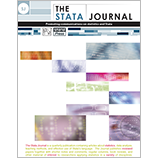A menu-driven facility for power and detectable-difference calculations in stepped-wedge cluster-randomized trials
Abstract. This article introduces the Stata menu-driven program steppedwedge,
which calculates detectable differences and power for stepped-wedge randomized
trials. The command permits continuous, binary, and rate outcomes (with normal
approximations) for comparisons using two-sided tests. The command allows specification
of the number of clusters randomized at each step, the number of steps
and the average cluster (cell) size, or an incomplete design in which the user specifies
the design pattern (a matrix with one row per cluster, one column per time
point, and entries indicating exposure and observable data). Cluster heterogeneity
can be parameterized using either the intracluster correlation or the coefficient of
variation (of the outcome). The command is illustrated via examples.
View all articles by these authors:
Karla Hemming, Alan Girling
View all articles with these keywords:
steppedwedge, stepped wedge, sample size, cluster-randomized controlled trials, power, detectable difference
Download citation: BibTeX RIS
Download citation and abstract: BibTeX RIS
|
